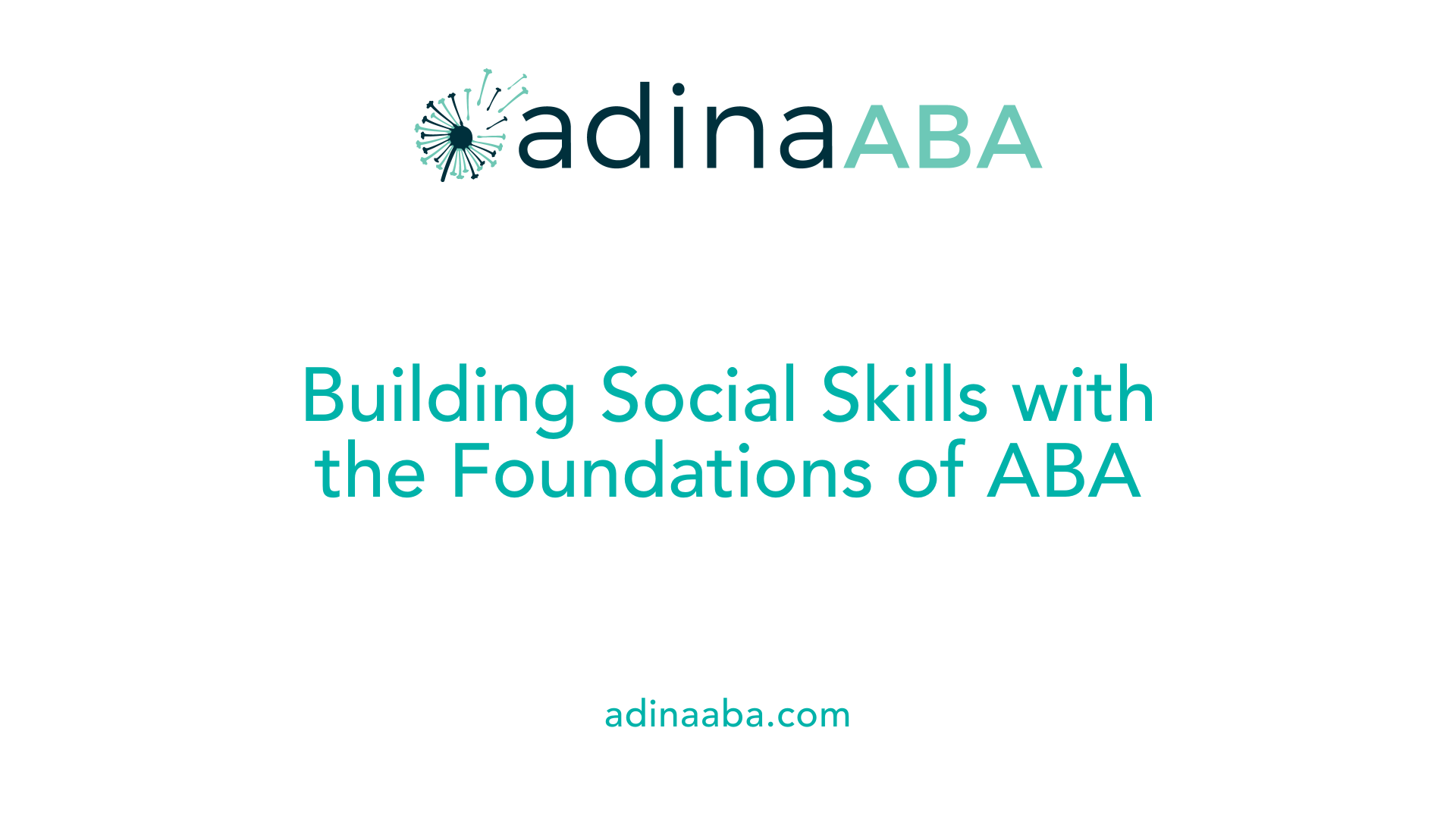The Role of ABA Therapy in Teaching Children with Autism to Navigate Peer Relationships

Understanding ABA's Impact on Social Navigation
Applied Behavior Analysis (ABA) is at the forefront of evidence-based interventions that support children with autism in developing essential social and peer-related skills. With a foundation grounded in the science of learning and behavior, ABA programs are tailored to individual needs, fostering social competence, communication, and emotional regulation. This article explores how ABA therapy helps children with autism navigate peer relationships, highlighting strategies, research evidence, and the vital role of parental involvement.
The Foundations of ABA in Social Skills Development

How ABA supports social skills growth
ABA therapy plays a pivotal role in fostering social skills among children with autism. This approach employs a variety of evidence-based techniques such as positive reinforcement, modeling, and role-playing to teach children how to engage with peers and adults effectively. By tailoring individualized programs overseen by trained behavior analysts (BCBAs), ABA targets specific social behaviors like initiating conversations, understanding social cues, and sharing. These structured interventions are implemented in natural settings, enabling children to learn in contextually relevant environments.
Research findings highlight that ABA significantly enhances social and communication skills. For instance, extensive studies show marked improvements in joint attention, social interaction, and emotional understanding. These gains contribute to better peer relationships and more active participation in social settings, which are essential for daily life functioning.
In addition to direct skill development, ABA integrates strategies that help children interpret nonverbal cues such as gestures and facial expressions. This comprehensive approach not only improves immediate social interactions but also promotes overall social independence and confidence.
Key techniques used in ABA for social development
ABA incorporates a suite of targeted techniques to build social communication skills. Some of the primary methods include:
| Technique | Description | Example of Use |
|---|---|---|
| Positive Reinforcement | Encourages desired social behaviors by rewarding them | Praising a child for sharing a toy to promote sharing behavior |
| Modeling | Demonstrates appropriate social behaviors for children to imitate | Using role-play to show appropriate greetings and conversations |
| Social Stories | Uses simple narratives to teach social norms and expected behaviors | Stories explaining how to take turns during group activities |
| Video Modeling | Shows videos of peers demonstrating social skills for children to watch | Watching videos of peers asking questions during play |
| Natural Environment Teaching (NET) | Integrates learning into daily routines and activities | Practicing greeting others during snack time or recess |
These techniques are often combined within customized programs to maximize social skills acquisition.
Individualized goals and intervention planning
Effective ABA programs are not one-size-fits-all. Instead, they involve detailed assessment and goal-setting tailored to each child's unique interests, needs, and current skills. Behavior analysts conduct thorough evaluations to identify specific social deficits and strengths.
Based on these assessments, they develop personalized intervention plans with clear, measurable objectives. Goals often include initiating conversations, understanding emotions, and engaging in cooperative play.
Implementation involves setting step-by-step targets, using reinforcement strategies, and continuously monitoring progress. As children achieve initial goals, interventions are adjusted to promote more complex social interactions. Family involvement is encouraged to reinforce learning across settings, ensuring skills transfer beyond therapy sessions.
This comprehensive and adaptable approach ensures that each child’s social development journey is supported effectively, enhancing their ability to navigate peer relationships confidently and successfully.
The Role of Play and Reinforcement in Social Skills Acquisition

How does ABA therapy support social skills development in children with autism?
Applied Behavior Analysis (ABA) is considered one of the most effective methods for promoting social skills in children with autism. It employs proven strategies such as positive reinforcement, modeling, role-playing, and natural environment training. These techniques are tailored to each child's unique needs and are overseen by trained behavior analysts, known as behavior analysts or BCBAs.
ABA programs specifically target essential social behaviors like initiating conversations, understanding social cues, active listening, and sharing. Through structured activities that integrate these skills into everyday situations, ABA helps children learn and practice behaviors that facilitate social interactions.
Research consistently shows that ABA therapy leads to considerable improvements in social and communication abilities. Studies highlight that children undergoing intensive ABA interventions demonstrate enhanced social engagement, better understanding of peer interactions, and increased independence in social settings.
By building social skills through a systematic approach, ABA not only improves children’s ability to interact but also fosters confidence and emotional well-being. Overall, ABA’s customized, evidence-based strategies make it a powerful tool for supporting meaningful social development in children with autism.
Building Bridges: The Lasting Impact of ABA on Social Success
ABA therapy not only enhances social skills but also empowers children with autism to build meaningful peer relationships and navigate complex social environments. Through structured interventions, evidence-based techniques, and active parental involvement, ABA fosters social competence, emotional regulation, and inclusive participation in school and community settings. The scientific validation of ABA’s effectiveness continues to endorse its vital role in promoting lifelong social success for children on the autism spectrum, shaping a future where peer connections and understanding flourish.
References
- Autism and Education in Early Years - Easterseals Arkansas
- Adapting ABA Therapy Strategies for Teens and Older Children
- Teaching Social Skills to Children with Autism - - Special Learning
- The effectiveness of applied behavior analysis program training on ...
- Autism to Peers: Educating Friends and Classmates | ABA Therapy
- Understanding Peer Pressure and Autism: Challenges and Solutions
- Applied Behavior Analysis (ABA) | Autism Speaks
- Impact of ABA Therapy: The Key Role of Parental Involvement
- Effective Classroom Strategies for Teaching Students with Autism
- Harnessing ABA Therapy for Social Skills Development in Autism
More Resources
Expert Clinicians
Get started today ->



.jpg)
.jpg)
.jpg)
